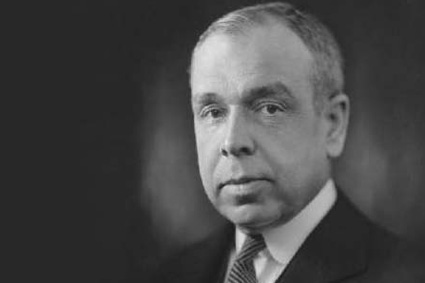SBC leader sees ‘chasm’ between liberals, evangelicals
Rather than representing two points on a spectrum of Christianity, evangelical Christianity and liberal Protestantism are different and competing religions, Albert Mohler, president of Southern Baptist Theological Seminary in Louisville, Ky., asserted in a podcast.
He said two recent scandals demonstrate “the depth of the chasm that separates evangelical Christianity from more liberal Protestant denominations, in particular the Episcopal Church.”
 In a recent podcast, Albert Mohler referenced early 20th century Presbyterian theologian J. Gresham Machen (above), whose book Christianity and Liberalism argued that liberalism was essentially a different religion than Christianity.One involves Suffragan Bishop Heather Cook, one of the highest-ranking officials in the Episcopal Diocese of Maryland, charged with manslaughter and drunk driving following a hit-and-run crash that killed a bicyclist in December.
In a recent podcast, Albert Mohler referenced early 20th century Presbyterian theologian J. Gresham Machen (above), whose book Christianity and Liberalism argued that liberalism was essentially a different religion than Christianity.One involves Suffragan Bishop Heather Cook, one of the highest-ranking officials in the Episcopal Diocese of Maryland, charged with manslaughter and drunk driving following a hit-and-run crash that killed a bicyclist in December.
A Jan. 9 New York Times story raised the question of whether in a rush to name a female bishop, church leaders failed to properly vet Cook, who pleaded guilty to drunk driving in 2010.
Mohler acknowledged evangelical Christians have their own share of moral scandals but said the two groups hold to a “different moral code,” further evident in a Religion News Service story about an openly lesbian and pro-choice seminary dean stepping down over conflicts with faculty and financial challenges.
“What is really scandalous in this situation is that this president didn’t lose her job because of her very prominent homosexuality advocacy nor her very open and ardent advocacy for abortion,” Mohler said. “Indeed, she didn’t lose her job because of those things. She probably got her job because of those causes.”
‘Different types of thought and life’
Mohler said he drew attention to the stories “not particularly to dwell upon the Episcopal Church” but rather to repeat a point made in the early 20th century by Presbyterian theologian and Bible scholar J. Gresham Machen.
Machen was a professor at Princeton Seminary who led a conservative revolt against modernist theology that resulted in formation of the Orthodox Presbyterian Church and Westminster Theological Seminary. In 1923, Machen wrote a book titled Christianity and Liberalism arguing that controversies of the day were not between two varieties of the same religion but two essentially different types of thought and life.
Machen is regarded among the last of the great leaders of Princeton theology, a Calvinist form of evangelical Christianity with followers including James P. Boyce, a Southern Baptist pastor, theologian and founder and first president of the Southern Baptist Theological Seminary in 1859.
In the 20th century, some observers believed the flagship seminary of the Southern Baptist Convention drifted into more modern theologies until a course correction in the 1980s and 1990s called the “conservative resurgence” required all seminary professors teach the Bible is without error and literally true.
That prompted massive turnover in the faculties of SBC seminaries, which in turn led to formation of a number of alternative theology schools aligned with the Cooperative Baptist Fellowship, an SBC breakaway group formed in 1991.
‘Two rival religions’
Mohler, elected as the ninth president of Southern Seminary in 1993, is a high-profile leader of a movement seeking return to the denomination’s Calvinist roots that goes by names including Neo-Calvinism and Young, Restless and Reformed.
“When you’re dealing with orthodox Christianity and Protestant liberalism, we are not dealing with two variants of the same religion,” Mohler said. “As Machen correctly said, judged by orthodox Christianity, we’re actually looking in this case at two rival religions, and these headlines, not to mention the stories behind them, make that point all too evident.”